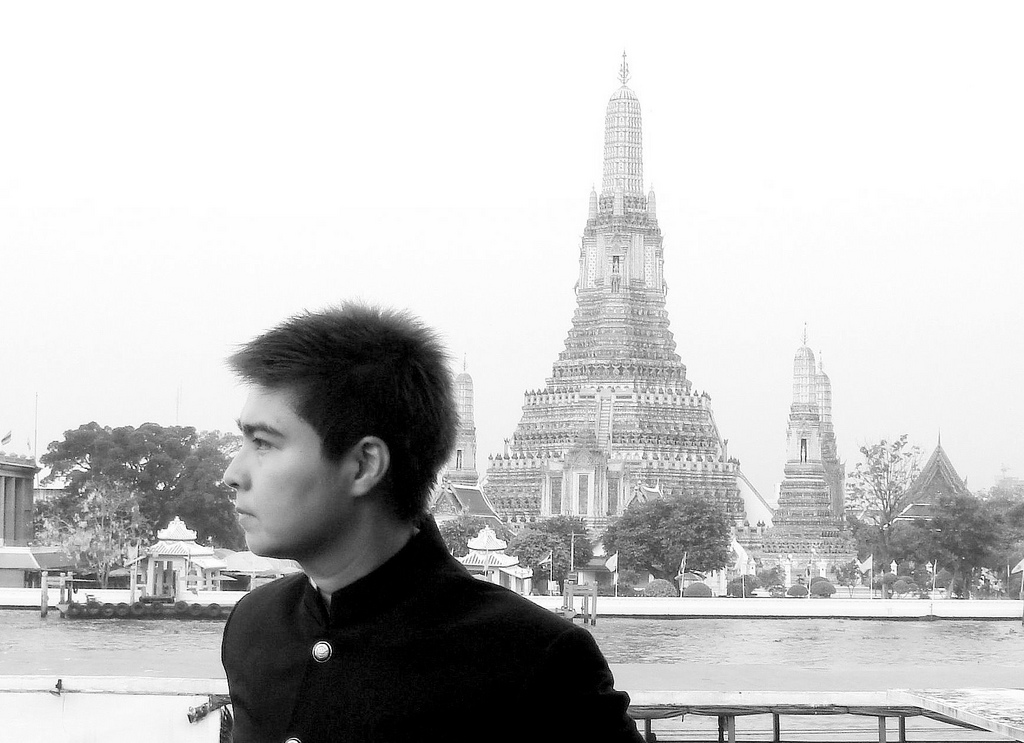
You Travel Far to Discover Home by Ben
“Fairy tales can come true. It can happen to you... if you're young at heart.”
Well, although what you are about to read now is not exactly a love story, it does have its fair share of love. The reason we have this headline is because, while the author was gathering thoughts for this piece, this very phrase actually popped up in mind.
Being a true believer in intuition, the author decided to stay with it. Who knows, this headline might draw the attention of someone out there who normally does not care to read this humble column, especially the romantic type!
Today we are going to look into a real life story of one of the author's friends from high school years. She kindly allowed the author to share her story with the readers because she also believes it would really benefit someone who may have led a life similar to her. In other words, she also believes that it could happen to you, dear readers.
Could it be you?
Enters Collette (her French nickname, given by our French teacher in high school). Collette used to believe that she has always had a decent life. And the author agrees with her. She is a bright lady brimmed with so much energy that she always electrifies everyone around her. And because of that, she has always been an achiever who has done great things not only for herself but for others around her as well.
Since high school, Collette made it to the university and faculty of her first choice and thoroughly enjoyed her college years. Then, she went overseas for her masters'. Coming back to Thailand, she fell in love and got married with a good-looking, respectable gentleman who dotes on her and who has also won the heart of her family.
If that alone is not enough. Collette has more. She always got to do what she wanted to do, not only in her career, but also in social work which is as important to her life as her family and work. She made some decent investment in real property and stocks and she was able to live comfortably.
Collette travelled a lot, both in Thailand and abroad. A life-long educational advocate, she always enjoyed learning new things and became the indispensable source of information when her friends need help. From health care to travel tips to restaurant recommendations, all you have to do is to give Collette a call. You won't be disappointed.
A perfect life, you might say. What more could a lady ask for? Children? Well, she and her husband do not have any but that was also their wish. She is busy enough now with her beloved nephew and never felt that her life is missing anything.
This first part of fairy tale's life was abruptly disrupted recently, when Thailand has entered a period of political and social mess. Being highly social-minded (she spent six months in Phuket helping victims of the 2004 Asian Tsunami), Collette felt exhausted. She developed some kind of deep-rooted depression that slowly built up in her subconscious mind. She felt that no matter what she did or tried to do to help the society, we are still in a big political, social, and moral chaos.
No matter how much love and dedication her husband, family and friends gave her, Collette was not able to shake off that heavy feeling. It took a toll on her health. One day, she found herself crying at night, not knowing exactly why she did so.
Being a courageous lady, she thought she could tough it out like she used to do with any other issues in life. It turned out that she could not. For three months, Collette found herself crying every night.
No matter how much merit she tried to do, no matter how many good activities she tried to engage herself in, her depression did not go away.
Collette was crying when she called the author one evening. She did not know what was happening to her. After trying to calm her down and give her some positive encouragement, the author invited her to come along for a mindfulness meditation retreat.
Although Collette knew that it is a good thing to do, especially if you are a Buddhist, she did not agree to go immediately. In other words, she still could not connect how mindfulness meditation could help her in the real world, in her daily life. Instead, she turned to a life of nightly parties. She tried to travel abroad even more often. But she could not get away from the depression in her own mind.
The author could not remember how long time went by until Collette gave another call. Perhaps it was months later. This time, she was more composed. Sensing that she might be ready to go now, the author invited her again, "Hey, I'm going again in two weeks' time. Wanna join?"
Without hesitation, Collette said, "Yes, can you please book a place for me?"
The author literally jumped with joy. "Yes!" was the reaction that spontaneously sprang up in the author's mind. For the author knew that, with her energy and her dedication to a cause she believes in, she would excel in her retreat and thus being able to lift herself out of her constant depression.
The author was not disappointed. Collette did give 100% in her very first retreat. The author observed with admiration how she delved into each practice session with sheer determination and zest. It was only the fourth day of our eight-day, seven-night retreat that Collette came to realize what life actually is and what her purpose of life should be.
She was able to see, by herself and not by anyone telling her so, that each and every suffering she experienced in life only came from within. And she also learned that, while she can not change the world, she could indeed change herself and achieve peace even if she is still living among the same old chaos. She also discovered that if she wants to continue "saving the world," she could still to do so. The only difference is that now she already sees that the only cause worth promoting to people is the cause of mindfulness.
If people have mindfulness in the Buddhist sense of the word, Collette discovered, the society would naturally be peaceful simply because one would be able to have compassion for all.
In one lengthy sitting session when the pain disturbed her so much while she was concentrating on cultivating mindfulness, she saw, with her mind's eyes, flashes of the brands of her favorite alcohol drinks. Then, a wisdom inside her told her that she has to quit this if she wants to have sustainable peace in her life.
And once she gave a determined vow to herself and to Lord Buddha during that sitting that she would not touch those beverages anymore, Collette experienced miracle. She was able to live with that pain with a peaceful mind. The pain did not go away miraculously, but her mind was lifted up one notch. And she was free.
In later sitting sessions, she even found herself smiling during the sitting. Collette has found the proven path to the peace within.
And Collette is now back on her fairy tale's life again, thanks to her willing to be "young at heart," meaning always opening up to learn new things. In Zen parlance, we call it "a beginner's mind." A Zen mind/beginner's mind opens up to any possibilities and not limited to our past experience.
Now, because she could make peace with herself, she could make peace with anyone. And that is the part that is related to love. For Collette was able to give loving kindness to all beings, including to her so-called political foe. Her complexion, a reflection of her mind, is now glowing healthily. Everybody in her family was astonished how glowing and happy she was when they welcomed her back home. Now everyone in her family wants to go the retreat.
If you have lived your life like Collette did, believing that you already have a decent livelihood and never cause harm to anyone, Collette has a message for you. "This (the mindfulness retreat) is the best thing that ever happened in my life. I wished I had done it earlier." She is still the same highly energetic Collette, but she now knows how to let go. Collette is as driven as ever, but she no longer feels exhausted. If this is not a fairy tale with a happy ending, then, what do you think it is?
Well, what are you waiting for? It could happen to you, you know. :-)








